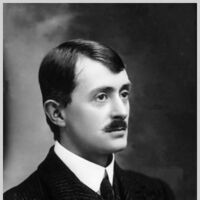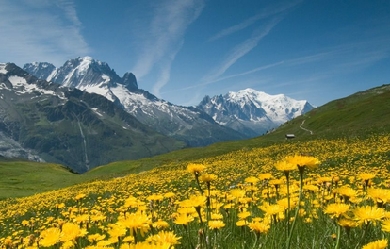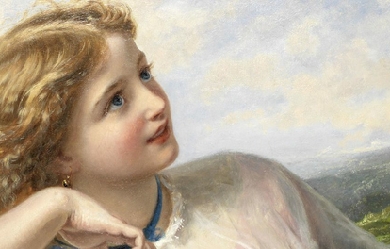Biography
When I am buried, all my thoughts and acts
Will be reduced to lists of dates and facts,
And long before this wandering flesh is rotten
The dates which made me will be all forgotten;
And none will know the gleam there used to be
About the feast days freshly kept by me,
But men will call the golden hour of bliss
‘About this time,’ or ‘shortly after this.’
Men do not heed the rungs by which men climb
Those glittering steps, those milestones upon time,
Those tombstones of dead selves, those hours of birth,
Those moments of the soul in years of earth.
They mark the height achieved, the main result,
The power of freedom in the perished cult,
The power of boredom in the dead man’s deeds
Not the bright moments of the sprinkled seeds.
By many waters and on many ways
I have known golden instants and bright days;
The day on which, beneath an arching sail,
I saw the Cordilleras and gave hail;
The summer day on which in heart’s delight
I saw the Swansea Mumbles bursting white,
The glittering day when all the waves wore flags
And the ship Wanderer came with sails in rags;
That curlew-calling time in Irish dusk
When life became more splendid than its husk,
When the rent chapel on the brae at Slains
Shone with a doorway opening beyond brains;
The dawn when, with a brace-block’s creaking cry,
Out of the mist a little barque slipped by,
Spilling the mist with changing gleams of red,
Then gone, with one raised hand and one turned head;
The howling evening when the spindrift’s mists
Broke to display the four Evangelists,
Snow-capped, divinely granite, lashed by breakers,
Wind-beaten bones of long-since-buried acres;
The night alone near water when I heard
All the sea’s spirit spoken by a bird;
The English dusk when I beheld once more
(With eyes so changed) the ship, the citied shore,
The lines of masts, the streets so cheerly trod
In happier seasons, and gave thanks to God.
All had their beauty, their bright moments’ gift,
Their something caught from Time, the ever-swift.
All of those gleams were golden; but life’s hands
Have given more constant gifts in changing lands;
And when I count those gifts, I think them such
As no man’s bounty could have bettered much:
The gift of country life, near hills and woods
Where happy waters sing in solitudes,
The gift of being near ships, of seeing each day
A city of ships with great ships under weigh,
The great street paved with water, filled with shipping,
And all the world’s flags flying and seagulls dipping.
Yet when I am dust my penman may not know
Those water-trampling ships which made me glow,
But think my wonder mad and fail to find,
Their glory, even dimly, from my mind,
And yet they made me:
not alone the ships
But men hard-palmed from tallying-on to whips,
The two close friends of nearly twenty years
Sea-followers both, sea-wrestlers and sea-peers,
Whose feet with mine wore many a bolthead bright
Treading the decks beneath the riding light.
Yet death will make that warmth of friendship cold,
And who’ll know what one said and what one told,
Our hearts’ communion, and the broken spells
When the loud call blew at the strike of bells?
No one, I know, yet let me be believed —
A soul entirely known is life achieved.
Years blank with hardship never speak a word
Live in the soul to make the being stirred;
Towns can be prisons where the spirit dulls
Away from mates and ocean-wandering hulls,
Away from all bright water and great hills
And sheep-walks where the curlews cry their fills;
Away in towns, where eyes have nought to see
But dead museums and miles of misery
And floating life un-rooted from man’s need
And miles of fish-hooks baited to catch greed
And life made wretched out of human ken
And miles of shopping women served by men.
So, if the penman sums my London days,
Let him but say that there were holy ways,
Dull Bloomsbury streets of dull brick mansions old
With stinking doors where women stood to scold
And drunken waits at Christmas with their horn
Droning the news, in snow, that Christ was born;
And windy gas lamps and the wet roads shining
And that old carol of the midnight whining,
And that old room above the noisy slum
Where there was wine and fire and talk with some
Under strange pictures of the wakened soul
To whom this earth was but a burnt-out coal.
O Time, bring back those midnights and those friends,
Those glittering moments that a spirit lends,
That all may be imagined from the flash,
The cloud-hid god-game through the lightning gash;
Those hours of stricken sparks from which men took
Light to send out to men in song or book;
Those friends who heard St. Pancras’ bells strike two,
Yet stayed until the barber’s cockerel crew,
Talking of noble styles, the Frenchman’s best,
The thought beyond great poets not expressed,
The glory of mood where human frailty failed,
The forts of human light not yet assailed,
Till the dim room had mind and seemed to brood,
Binding our wills to mental brotherhood;
Till we became a college, and each night
Was discipline and manhood and delight;
Till our farewells and winding down the stairs
At each gray dawn had meaning that Time spares
That we, so linked, should roam the whole world round
Teaching the ways our brooding minds had found,
Making that room our Chapter, our one mind
Where all that this world soiled should be refined.
Often at night I tread those streets again
And see the alleys glimmering in the rain,
Yet now I miss that sign of earlier tramps,
A house with shadows of plane-boughs under lamps,
The secret house where once a beggar stood,
Trembling and blind, to show his woe for food.
And now I miss that friend who used to walk
Home to my lodgings with me, deep in talk,
Wearing the last of night out in still streets
Trodden by us and policemen on their beats
And cats, but else deserted; now I miss
That lively mind and guttural laugh of his
And that strange way he had of making gleam,
Like something real, the art we used to dream.
London has been my prison; but my books
Hills and great waters, labouring men and brooks,
Ships and deep friendships and remembered days
Which even now set all my mind ablaze —
As that June day when, in the red bricks’ chinks
I saw the old Roman ruins white with pinks
And felt the hillside haunted even then
By not dead memory of the Roman men;
And felt the hillside thronged by souls unseen
Who knew the interest in me, and were keen
That man alive should understand man dead
So many centuries since the blood was shed,
And quickened with strange hush because this comer
Sensed a strange soul alive behind the summer.
That other day on Ercall when the stones
Were sunbleached white, like long unburied bones,
While the bees droned and all the air was sweet
From honey buried underneath my feet,
Honey of purple heather and white clover
Sealed in its gummy bags till summer’s over.
Then other days by water, by bright sea,
Clear as clean glass, and my bright friend with me;
The cove clean bottomed where we saw the brown
Red spotted plaice go skimming six feet down,
And saw the long fronds waving, white with shells,
Waving, unfolding, drooping, to the swells;
That sadder day when we beheld the great
And terrible beauty of a Lammas spate
Roaring white-mouthed in all the great cliff’s gaps,
Headlong, tree-tumbling fury of collapse,
While drenching clouds drove by and every sense
Was water roaring or rushing or in offence,
And mountain sheep stood huddled and blown gaps gleamed
Where torn white hair of torrents shook and streamed.
That sadder day when we beheld again
A spate going down in sunshine after rain
When the blue reach of water leaping bright
Was one long ripple and clatter, flecked with white.
And that far day, that never blotted page
When youth was bright like flowers about old age,
Fair generations bringing thanks for life
To that old kindly man and trembling wife
After their sixty years: Time never made
A better beauty since the Earth was laid,
Than that thanksgiving given to grey hair
For the great gift of life which brought them there.
Days of endeavour have been good: the days
Racing in cutters for the comrade’s praise.
The day they led my cutter at the turn,
Yet could not keep the lead, and dropped astern;
The moment in the spurt when both boats’ oars
Dipped in each other’s wash, and throats grew hoarse,
And teeth ground into teeth, and both strokes quickened
Lashing the sea, and gasps came, and hearts sickened,
And coxswains damned us, dancing, banking stroke,
To put our weights on, though our hearts were broke,
And both boats seemed to stick and sea seemed glue,
The tide a mill race we were struggling through;
And every quick recover gave us squints
Of them still there, and oar-tossed water-glints,
And cheering came, our friends, our foemen cheering,
A long, wild, rallying murmur on the hearing,
‘Port Fore!’ and ‘Starboard Fore!’ 'Port Fore’ ‘Port Fore,’
‘Up with her,’ 'Starboard’; and at that each oar
Lightened, though arms were bursting, and eyes shut,
And the oak stretchers grunted in the strut,
And the curse quickened from the cox, our bows
Crashed, and drove talking water, we made vows,
Chastity vows and temperance; in our pain
We numbered things we’d never eat again
If we could only win; then came the yell
‘Starboard,’ ‘Port Fore,’ and then a beaten bell
Rung as for fire to cheer us. ‘Now.’ Oars bent,
Soul took the looms now body’s bolt was spent,
‘Damn it, come on now.’ ‘On now,’ ‘On now,’ ‘Starboard.’
‘Port Fore,’ 'Up with her, Port’; each cutter harboured
Ten eye-shut painsick strugglers, ‘Heave, oh heave,’
Catcalls waked echoes like a shrieking sheave.
‘Heave,’ and I saw a back, then two. ‘Port Fore,’
‘Starboard,’ 'Come on’; I saw the midship oar,
And knew we had done them. ‘Port Fore,’ ‘Starboard,’ ‘Now.’
I saw bright water spurting at their bow,
Their cox’ full face an instant. They were done.
The watchers’ cheering almost drowned the gun.
We had hardly strength to toss our oars; our cry
Cheering the losing cutter was a sigh.
Other bright days of action have seemed great:
Wild days in a pampero off the Plate;
Good swimming days, at Hog Back or the Coves
Which the young gannet and the corbie loves;
Surf-swimming between rollers, catching breath
Between the advancing grave and breaking death,
Then shooting up into the sunbright smooth
To watch the advancing roller bare her tooth;
And days of labour also, loading, hauling;
Long days at winch or capstan, heaving, pawling;
The days with oxen, dragging stone from blasting,
And dusty days in mills, and hot days masting.
Trucking on dust-dry deckings smooth like ice,
And hunts in mighty wool-racks after mice;
Mornings with buckwheat when the fields did blanch
With White Leghorns come from the chicken ranch;
Days near the spring upon the sunburnt hill,
Plying the maul or gripping tight the drill;
Delights of work most real, delights that change
The headache life of towns to rapture strange
Not known by townsmen, nor imagined; health
That puts new glory upon mental wealth
And makes the poor man rich.
But that ends, too.
Health, with its thoughts of life; and that bright view,
That sunny landscape from life’s peak, that glory,
And all a glad man’s comments on life’s story,
And thoughts of marvellous towns and living men,
And what pens tell, and all beyond the pen,
End, and are summed in words so truly dead
They raise no image of the heart and head,
The life, the man alive, the friend we knew,
The minds ours argued with or listened to,
None; but are dead, and all life’s keenness, all,
Is dead as print before the funeral;
Even deader after, when the dates are sought,
And cold minds disagree with what we thought.
This many-pictured world of many passions
Wears out the nations as a woman fashions,
And what life is is much to very few;
Men being so strange, so mad, and what men do
So good to watch or share; but when men count
Those hours of life that were a bursting fount
Sparkling the dusty heart with living springs,
There seems a world, beyond our earthly things,
Gated by golden moments, each bright time
Opening to show the city white like lime,
High-towered and many-peopled. This made sure,
Work that obscures those moments seems impure,
Making our not-returning time of breath
Dull with the ritual and records of death,
That frost of fact by which our wisdom gives
Correctly stated death to all that lives.
Best trust the happy moments. What they gave
Makes man less fearful of the certain grave,
And gives his work compassion and new eyes.
The days that make us happy make us wise.



